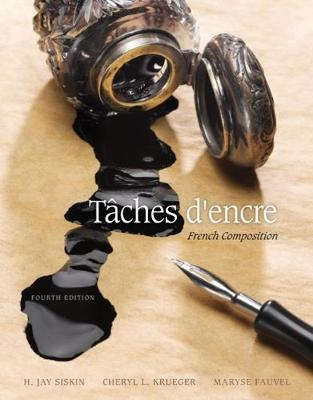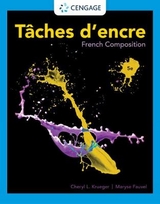
Taches d'encre
CENGAGE Learning Custom Publishing (Verlag)
978-1-305-58028-2 (ISBN)
- Titel erscheint in neuer Auflage
- Artikel merken
H. Jay Siskin (Ph.D., Cornell) is Professor of French and Program Chair of World Languages at Cabrillo College. He is the author of five textbooks in French, as well as numerous articles and reviews that have appeared in such publications as THE FRENCH REVIEW, FOREIGN LANGUAGE ANNALS, and the PMLA. Prof. Siskin serves as chair of the Modern Language Association’s Division on the Teaching of Language, a member of that association’s Committee on Awards and Honors and its Delegate Assembly. Cheryl Krueger is associate professor of French at the University of Virginia, where she teaches a variety of undergraduate and graduate level courses on French language, literature, culture and cinema. She has served as chair of the Department of French Language and Literature and as director of undergraduate programs. In addition, she is part of the editorial board of DIX-NEUF, (JOURNAL OF THE SOCIETY OF DIX-NEUVIÉMISTES), has served on the AAUSC editorial board and is an elected member of the MLA's 19th-Century French Literature Division Executive Committee. Krueger is author of PERSPECTIVES ON TEACHING LANGUAGE AND CONTENT (Yale University Press, 2020) and THE ART OF PROCRASTINATION: BAUDELAIRE'S POETRY IN PROSE (University of Delaware Press, 2007); editor of APPROACHES TO TEACHING BAUDELAIRE'S PROSE POEMS (MLA, 2017); and co-author of MISE-EN-SCÈNE: CINÉMA ET LECTURE. Her articles have appeared in such journals as DIX-NEUF, FRENCH FORUM, FOREIGN LANGUAGE ANNALS, LITERATURE/FILM QUARTERLY, MODERN LANGUAGES OPEN, NINETEENTH-CENTURY FRENCH STUDIES, ROMANCE NOTES, WOMEN IN FRENCH STUDIES and LITTERATURE. Krueger’s current research focuses on 19th-century French literature and culture, French cinema, and the senses, olfaction and perfume. Her interest in helping students find their voice in French developed over the many years she served as language program director at UVA. Her approach to teaching writing is informed by a combination of research in SLA and plenty of practice experimenting with new techniques and course design. Cheryl advocates the book's interactive, process-writing for writers at any level -- from students just beginning to professionals writing for publication. Maryse Fauvel is professor emerita in French and Francophone studies at the College of William and Mary, where she served as chair of the Department of Modern Languages and Literatures from 2013-2017. She has taught advanced writing courses as well as 20th-century French literature, women writers, French cinema, European cinema, literary theory, secrets and revelations, and ecocriticism. Her research areas include literature and the visual arts, cinema, contemporary women writers and filmmakers, postmodernism and postcolonial cultures. In addition to numerous articles, Fauvel published EXPOSER L'AUTRE: ESSAI SUR LA CITÉ NATIONALE DE L' HISTOIRE DE L'IMMIGRATION ET LE MUSÉE DU QUAI BRANLY (Paris: L'Harmattan, 2014); A VOUS DE VOIR: DE L'IDÉE AU PROJET FILMIQUE (Paris: Casteilla, 2010), co-authored with Martin and Martin; and SCÈNES D' INTÉRIEUR: SIX ROMANCIERS DES ANNÉES 1980-1990 (Birmingham: Summa, 2007). She received a B.A. and M.A. from CAPES Universite de Paris and an M.A. and Ph.D. from the University of Wisconsin.
Preface. TO THE STUDENT.
Préliminaire. VERS LA COMPOSITION.
Individual writing survey. Appreciating writing. Appreciating your own writing. Your writing process. Rewriting and editing. The process of writing. Getting started. Your personal writing style. Writing drafts and editing your work. Rereading your work. Peer editing. Resources. Using a bilingual dictionary. The French-French dictionary. The dictionary of synonyms. A reference grammar.
1. LA DESCRIPTION.
Texte: Blue Bay, Appanah. Functions: situer dans l'espace et le temps; décrire.
Vocabulaire utile / Les actes de parole: substantifs, adjectifs, verbes pour décrire un paysage; expressions pour parler des mouvements et des perceptions, de la nature, des impressions, des sens; les couleurs. La stylistique: la comparaison, la métaphore, la personnification; eviter les verbes plats; la perspectif.
2. LE PORTRAIT.
Texte: Travail de rêve, Sijie. Functions: décrire; traduire les émotions et d'autres facultés. Vocabulaire utile / Les actes de parole: adjectifs et expressions pour décrire le caractère;
expressions pour parler des rapports entre les personnes, de l'âge; substantifs, adjectifs, verbes, expressions pour parler de l'aspect physique; le sens et la position des adjectifs. La stylistique: emploi des pronoms relatifs, le participe passé, le participe présent pour varier l'expression; l'emploi de ce qui/que pour mettre en relief un élément de la phrase.
3. LE COMPTE RENDU.
Texte: Compte rendu du film Kirikou et la sorcière. Functions: décrire; résumer les idées principales; analyser et évaluer un texte; donner un avis. Vocabulaire utile /
Les actes de parole: les genres, mouvements et courants dans le cinéma; vocabulaire cinématographique; substantifs, adjectifs, verbes, expressions pour exprimer les réactions; les époques de l'histoire; expressions, verbes pour émettre un jugement. La stylistique: la phrase nominale; l'infinitif comme sujet; le participe passé pour éviter la voix passive.
4. LA NARRATION.
Texte: La prise de conscience, de Beauvoir. Functions: raconter une histoire; rapporter le dialogue. Vocabulaire utile / Les actes de parole: adverbes et expressions pour raconter un évènement inattendu; adjectifs pour parler des réactions; évènement dans le temps et pour exprimer un laps de temps; verbes pour indiquer un déplacement; expressions pour communiquer des idées; expressions pour narrer chronologiquement expressions pour situer un. La stylistique: narrer au passé; le discours direct et indirect; l'élipse sujet-verbe.
5. L'ESSAI.
Texte: La Contagion, Camus. Functions: exprimer et défendre une opinion; convaincre; formuler une hypothèse. Vocabulaire utile / Les actes de parole: substantifs, adjectifs, verbes, expressions pour parler des injustices; verbes et expressions pour exposer un problème, présenter une opinion, donner des exemples, exprimer la cause et la conséquence. La stylistique: C'est/Ce sont… que/qui; l'opposition.
6. LA DISSERTATION.
Texte: Exemple. Functions: comparer et contraster; exprimer et défendre une opinion; convaincre; formuler une hypothèse. Vocabulaire utile / Les actes de parole: substantifs, adjectifs, verbes, expressions pour parler du progrès, des problèmes et des solutions écologiques; mots et expressions de transition. La stylistique: le participe présent; l'infinitif substantivé.
7. LE COMMENTAIRE COMPOSE. Texte: Commentaire composé sur le poème Ce cœur qui haïssait la guerre, Desnos. Functions: analyser en détail; comparer et constraster; exprimer et défendre une opinion. Vocabulaire utile /
Les actes de parole: expressions pour commenter un thème, une image ou une œuvre; vocabulaire technique pour analyser la poésie; variations du language analytique. La stylistique: les questions rhétoriques.
8. LA CORRESPONDANCE. Texte: Lettre de motivation et CV. Functions: demander des renseignements; faire une demande polie. Vocabulaire utile / Les actes de parole: langage administratif; substantifs, verbes et adjectifs pour parler de
| Erscheint lt. Verlag | 1.1.2016 |
|---|---|
| Verlagsort | Mason, OH |
| Sprache | englisch |
| Maße | 214 x 11 mm |
| Gewicht | 477 g |
| Themenwelt | Schulbuch / Wörterbuch ► Erwachsenenbildung |
| Schulbuch / Wörterbuch ► Wörterbuch / Fremdsprachen | |
| Geisteswissenschaften ► Sprach- / Literaturwissenschaft ► Sprachwissenschaft | |
| ISBN-10 | 1-305-58028-1 / 1305580281 |
| ISBN-13 | 978-1-305-58028-2 / 9781305580282 |
| Zustand | Neuware |
| Informationen gemäß Produktsicherheitsverordnung (GPSR) | |
| Haben Sie eine Frage zum Produkt? |
aus dem Bereich



